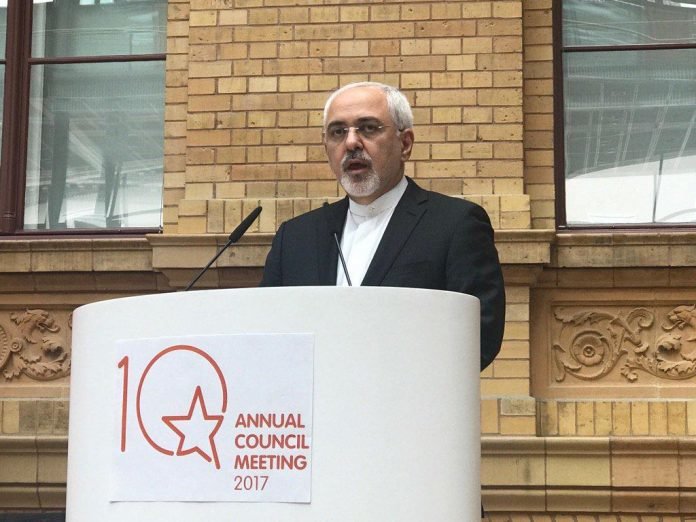Iran’s Zarif urges Europe to help resolve Persian Gulf conflicts

TEHRAN – Iranian foreign minister on Monday called on Europe to get involved in Persian Gulf conflicts more seriously, citing the positive role it played in a nuclear deal between Iran and six world powers.
“Europe has the capabilities and values to help resolve Persian Gulf conflicts,” Mohammad Javad Zarif said in an address to the European Council on Foreign Relations (ECFR) in Berlin.
“With the nuclear issue we had a lose-lose game with the U.S. until we redefined the problem with Europe’s active participation,” the Iranian foreign minister added.
Europe played a key role in brokering the 2015 international nuclear deal, which removed all nuclear-related sanctions against Iran in exchange for Tehran placing limits on its nuclear activities.
The nuclear accord resulted from “positive-sum thinking”, Zarif highlighted, noting that it was triumph for everyone.
“The nuclear deal between Tehran and world powers worked because it was a victory for all. We must remember the importance of positive-sum thinking,” he went on to say.
Despite a vehement, hostile attitude from the Trump administration toward the nuclear deal, the European Union has fully backed it, keeping regular session between signatories to assure the deal’s planned implementation.
Tehran’s expectations to rebuild its sluggish economy at the wake of the deal, however, have failed to materialize fully, partially due to the region’s turbulent situation.
Since the conclusion of the nuclear deal, Saudi Arabia has intensified its hostility with Tehran, fearing a close relationship between Iran and the European Union and the flourishing of the Iranian economy.
“We have to abandon delusions of zero-sum foreign policy, that geography can be changed, and that we can overcome our neighbours,” Zarif noted, an implicit reference to anti-Iran policies of the Saudi kingdom.
When foreign policy becomes a commodity, then purchasing military equipment becomes your yardstick for measuring who is a terrorist or who isn’t a terrorist. Europe can broker ‘regional security framework’ in Meddle East
The Iranian foreign minister further called for regional security order in the wider Persian Gulf region.
“Our region needs a regional security framework. Europe should work on establishing such a framework,” he added.
“We need a Persian Gulf regional security forum to promote dialogue over demonization.”
Zarif further pointed to the countries who claimed that Iran and Qatar were supporting terrorism, saying they were trying to shun responsibility for their own failures in addressing the demands of their own people.
“One day it’s Iran, today it’s Qatar,” Zarif said, adding, “It’s an attempt to evade responsibility, escape accountability for this very fundamental … failure of the state system to address, to respond to the demands of its population.”
In making the comments, Zarif was referring to Saudi Arabia, joined by the UAE, Bahrain and Egypt severing all political ties with Qatar on June 5, citing Doha’s support for the Palestinian Hamas resistance group and the Muslim Brotherhood as well as good ties with Iran.
Earlier on Friday, reports emerged that the Saudi-led bloc had given Qatar 10 days to comply with 13 demands, which included shutting down the Al Jazeera Media Network, closing a Turkish military base and scaling down ties with Iran.
The foreign minister said no one can purchase its security from outside, and that foreign policy is not a commodity.
Also, in a reference to the hefty May arms deals between Saudi Arabia and the U.S. during President Trump’s visit to the country, the top diplomat said: “Arms deals are not partnerships. […] Too many are afflicted by the misconception that security can be purchased.”
“When foreign policy becomes a commodity, then purchasing military equipment becomes your yardstick for measuring who is a terrorist or who isn’t a terrorist,” the Iranian minister added.
Zarif went on to say that the blame game promoted by Saudi Arabia is very much similar to that promoted by the ISIS terrorist group.
“Personal hope is the crucial ingredient for social and international stability. Hopelessness leads to hate,” he added.
The countries in the Middle East have failed to address needs of populace to participate in national life, and this leads to violent reaction of the youth, the top diplomat noted.
Middle East and North Africa region suffer from structural problems, including asymmetry in size, wealth, population, Zarif said.
“The discourse of hate and discourse of exclusion in our region can be exported worldwide creating disaster beyond what you imagine,” he stressed.
AK/PA
Leave a Comment